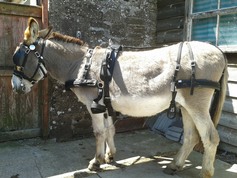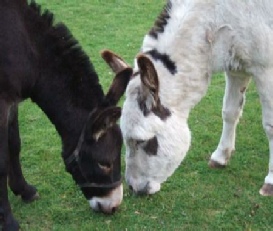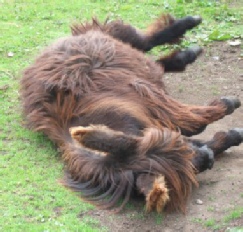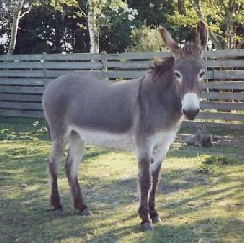



Donkeys are versatile animals and are generally more tolerant, placid and usually less spooky than small ponies. They are therefore good pets for children to learn basic animal care and for riding, showing, driving or just companionship. They require as much time and commitment as a pony or horse, and have particular needs over and above this since they are not native to the UK and their coats are not designed to cope with the wet weather conditions we experience here. They therefore need access to shelter at all times, and may also need rugging up depending on weather conditions. Donkeys can live to over 40 years old although on average they live to around 27 years in the UK. Owning a donkey is a long-term commitment. They do not like being kept on their own and this usually manifests itself in loud braying, which if you have close neighbours, does not make you popular. It is therefore essential for them to have a companion, preferably another donkey, but failing that, a horse or pony, or even a goat.
The information on this page gives a brief outline of some of the things a prospective donkey owner should consider. The Donkey Sanctuary and Donkey Breed Society provide some extremely useful and detailed literature on all aspects of donkey-keeping.
Training and Handling
Donkeys should be a pleasure to be with. The very basics a donkey should understand is how to stand quietly tied up, how to lead beside you without charging ahead or dragging behind and to stop when told, how to pick up his feet when requested and how to move over when asked. The training and handling of our donkeys is based on a combination of Parelli work and the techniques used by the very successful dog trainer, Cesar Millan. Contrary to popular belief, donkeys are generally highly intelligent and we have found them to be more akin to a large dog than a horse for example when it comes to teaching them new things. They also have a keen sense of humour ~ what you want and what they are prepared to deliver can be two entirely different things on occasion! 
When accommodation and time permits, we sometimes take donkeys for basic training and handling. For more information please contact us.
 Feeding
Feeding
Donkeys are grazing animals, however if left to graze all day in lush pasture they will very quickly become obese, which if taken to extreme may prove fatal. They will also run the risk of contracting laminitis. We feed our donkeys on good hay and straw, limited in summer dependent on whether they are stabled at night, and in winter we add some molassed chaff as a treat. They do not need oats, bran, cereals or any form of concentrated feed (unless they are very underweight, old or very ill) as their metabolism is adapted to coping with a high fibre diet, having their origins in hot countries where vegetation is sparse and coarse. Elderly donkeys have special dietary needs, particularly if their teeth are worn right down or missing as this will affect their ability to chew. There are a range of feeds specifically designed for veterans.

Worming
Donkeys can be the host for large numbers of lungworm and liver fluke without the animal showing any signs. They can however be passed on to horses which, if infected, will suffer from lung problems which may prove irreversible or even fatal. Therefore donkeys (and any equine within the vicinity) should be regularly wormed with a wormer that specifically kills these parasites.

Foot Care
Donkeys feet differ to those of the horse by being more upright. They require regular visits from the farrier around every 6 to 10 weeks to keep them trimmed and level. Hooves grow more quickly in spring and summer when there is good grass. Feet should be picked out and inspected daily to ensure they are disease free, not smelly and to make sure that small stones and grit have not worked their way into the sole or horn.
Finally....who to ask for help and advice
The Donkey Breed Society has local area commissioners throughout the UK who will offer advice and guidance. In addition, the Donkey Sanctuary has trained welfare officers also located throughout the country. Details can be found on their web sites. Any reliable breeder will also be happy to discuss donkey matters with genuine callers.
